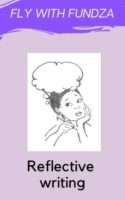What is a reflective essay?
Reflective writing describes your own thoughts, experiences and insights. When we reflect on something, we think deeply about it.
Some reflective essay topics are:
-
- That day I learnt a lesson I will never forget.
- The most difficult thing I have ever had to do.
- My personal achievements and struggles this year.
- The languages I speak and how i feel about them
In a reflective essay you are sharing your thoughts and feelings, and so the style can be personal and even informal.
A reflective essay is not the same as a diary entry. Of course they can be similar, because they both describe your own experience. But a diary entry can be just a good description of an event. A reflective essay should have some analysis of the event. So it is more thoughtful than a diary entry. It tells what you learnt from an experience or event.
What are some of the features of a reflective essay?
A reflective essay is always written in the first person. So you will use the pronouns I and me a lot.
- I realised that I can overcome any problem in my life. √
- He realised that he could overcome any problem in his life. ×
You can use direct speech in a reflective essay. Giving the words that you say or that others say to you can help the reader to imagine the people you describe. It is good to draw specific examples from your life to illustrate what you mean.
Although you are going to be reflecting on your experience, avoid ‘preaching’ at the reader and telling them what to do. Make it clear you are giving your own thoughts eg I think girls should not go out with boys until they have finished school. NOT Girls should not go out with boys until they have finished school.
Use full sentences and correct grammar.
How to plan a reflective essay
You could plan a reflective essay like this:
Introductory paragraph: Start with an interesting hook. This could be an unusual description, or a statement that will get the attention of the reader.
Paragraph 2: Describe the events. Probably chronological order will be best. (Chronological means in the order in which they occurred.) This paragraph will be in the past tense.
Paragraph 3: Describe the consequences or results.
Paragraph 4: Analyse the event.
Concluding paragraph: End by bringing the different parts of your essay together. Think of an interesting essay so that the reader understands your ideas.
Note: This is just ONE way of structuring a reflective essay, and certainly not the ONLY way.
Should you choose a reflective essay in an exam?
Yes, if the topic is something you have experienced. For example, if the topic is: The most difficult thing I have ever had to do, then do not choose it if you have never had to do anything difficult in your life! Reflective essays are best if you keep them simple and honest. So do not write about the time you had to fly an aeroplane in an emergency, or about the time you met Muhammad Ali. But do write about the time you stood up to someone who was doing something wrong, or about the time you saw your grandparent for the last time.


